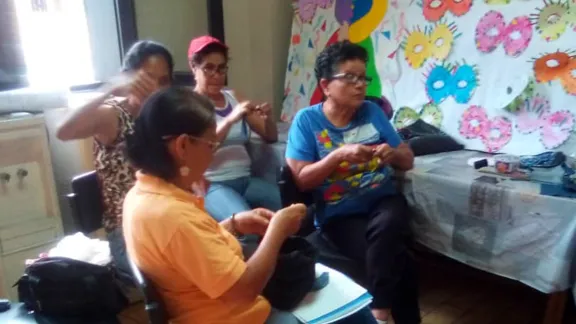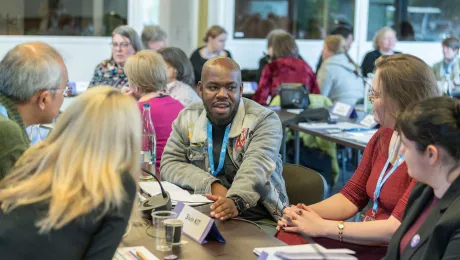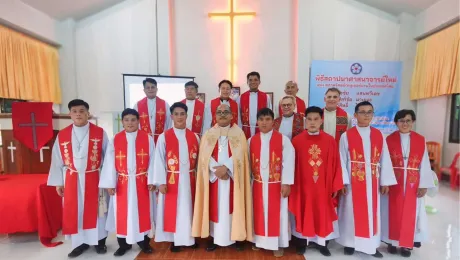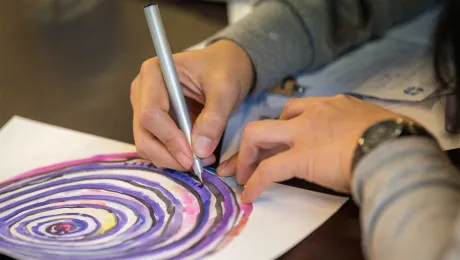
Participants in a sewing workshop for mothers and other community members at the IELV-run
Lutheran church provides a safe place and alternative income sources
(LWI) - For the last three months, *Layla has adopted a new routine. She starts by dropping her five-year daughter at the "Casa de la Amistad" (House of Friendship) pre-school located in Venezuela’s northern city of Valencia. Then she joins a group of women in the same building who are taking part in a workshop organized by the Evangelical Lutheran Church in Venezuela (IELV).
Today, she will be putting finishing touches to her first hand-made house slippers that are among several items produced by participants in such workshops. Everything here is made by hand. Young mothers like Layla and older women are sewing small purses, shoulder and shopping bags, cutting out floral decorations, making tablecloths and other products. The workshop facilitators too teach professional sewing by hand. Most participants do not have a sewing machine or the resources to purchase one.
Handicraft and bakery workshops are part of IELV’s project on strengthening mission and diakonia, which the church began in 2016. The goal is to offer alternative solutions to communities experiencing extreme social and financial exclusion, and accompany many congregations that are struggling to survive. The Lutheran World Federation (LWF) has been supporting the project since 2018. “This solidarity is even more critical now in view of the still unresolved political crisis in Venezuela, and on top of that the coronavirus pandemic,” says project coordinator Ms Judith Bracho Villegas.
Absolute socioeconomic vulnerability
Bracho says the political crisis since 1997 “has resulted in a situation of absolute socioeconomic vulnerability for Venezuelan families.” The number of people requiring humanitarian assistance from the church “increases by the day, including our congregation members and personnel, so we have to always think of creative ways of meeting the most urgent yet basic needs, and make adjustments,” she adds.
Referring to statistics from R4V, a regional platform that coordinates the status of migrants and refugees from Venezuela, she says by early April, 5 million Venezuelans had been registered in this category mostly in neighboring countries. “However, the economic and social difficulties here affect more than 90 percent of the entire population of 28 million people. Of course, there are extremely serious cases, but we are all affected, and our quality of life has been deteriorating at a dizzy rate in recent years.”
The IELV project coordinator cites recent parliamentary committee reports and other government sources to demonstrate the impact. Accumulated hyperinflation stood at 7,374 percent at the end of 2019; a school drop-out rate of 87 percent; and inadequate or non-existent public services including water and health. Only 23 percent of the population receives continuous piped water supply. “Where I live, we get water only twice a week,” she adds.
COVID-19 complicates a dire humanitarian crisis
In the wake of the Coronavirus disease (COVID-19), Bracho, like many other people in the country, fears there will be “an even worse health crisis” in view of the human and institutional incapacity to adopt measures that can reduce the spread of coronavirus. By 15-April, Venezuela had registered 181 confirmed cases of COVID-19 and nine deaths according to the World Health Organization.
Public hospitals can hardly cope with an additional crisis. They lack equipment and materials including medicine, regular water and electricity supply, and the low wages they pay their medical and clinical personnel--around USD 10 per month--mean fewer and fewer doctors and nurses are working in the government-run institutions. However, the IELV project coordinator is full of praise for the many committed health professional who continue to offer their services in spite of the poor working conditions.
She welcomes the government’s directive on 19 March asking people to stay at home, suspending educational and labor activities, except for commercial food retailers and health personnel, and the closure of its international borders to reduce the spread of coronavirus. But Bracho says, “implementing such a measure is extremely complicated,” in a country with hardly any person earning enough to purchase supplies for several days. “They must go out almost daily to buy food and other basic needs, which they can barely afford.”
The constant fuel shortage complicates everything, Bracho continues. Food production and distribution, which was already affected by the socioeconomic crisis “is now simply paralyzed.” City dwellers are experiencing a shortage of fruits, vegetables, meats and dairy, because the agricultural producers have not been able to move their products from the countryside to the city.
Worried about the children’s home
The coronavirus pandemic aggravates an already bad situation, and Bracho is particularly concerned about the sustainability of "Love, Faith and Hope", a home for abandoned or street children maintained by the church since 1993. The future of the 18 children and seven adult caregivers there depends entirely on the Venezuelan Lutheran church, and the support it receives from its partners, including food supplies. The church’s diaconal work benefits another 150 people in need, including congregation members in the capital Caracas, in Barquisimeto, Puerto Cabello and Turén.
The church can offer not only practical life skills but also the emotional and spiritual support needed by so many families and entire communities in this country.
In spite of the myriad challenges, Bracho wants to remain focused on the long-term impact of IELV’s work. Through the pre-school and handicraft workshops, “the church can offer not only practical life skills but also the emotional and spiritual support needed by so many families and entire communities in this country,” she adds. Women like Layla can leave their small children in a safe place and the skills they gain at the workshops are a life-long investment.
She also draws strength from the support and prayers of the global Lutheran communion, and is convinced that things will change in Venezuela for the better. “This is the place and the moment in which I must be. I want to be here when the situation improves so that we can all start rebuilding this country,” Bracho concludes.


House slippers, tablecloths, and beautifully decorated purses, are among the many items produced by women at the “House of Friendship.”
*Name has been changed.


